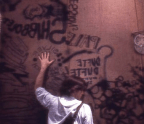
Don Siegel’s superior crime picture Charley Varrick (1973) was supposed to be called Last of the Independents, but that title was nixed by Universal honcho Lew Wasserman. This probably gives even more credence to the subversive, stick-it-to-the-system notion nestled inside this tale of a crop-duster pilot who has resorted to small-scale robbery for a living because he can no longer compete against the capitalist monopoly in his legal job.
The film begins with the heist of a backwater bank, in which Varrick (Walter Matthau) loses two accomplices—including his wife (Jacqueline Scott)—but makes an unexpectedly big haul. When the amount is covered up in official reports, Varrick realizes that he and his dimwitted surviving partner (Andy Robinson) must have unknowingly made off with laundered mafia money, and has to rely on his wits to take on the syndicate, whose delegates—one businesslike (John Vernon), one murderously criminal (Joe Don Baker)—soon get on his trail.
Charley Varrick was originally written for Clint Eastwood, who had just had a career-defining success with the Siegel-helmed Dirty Harry (1971), but the star declined, allegedly because he found no redeeming features in the title character. (Siegel surely relished his riposte of inserting an Eastwood quip directed at Baker.) Matthau wasn’t too happy with the script either—the director outlines their arguments, with his usual dry candour, in the posthumously published autobiography A Siegel Film—and Siegel faults the actor’s public complaints for the studio’s lack of interest in the film. Despite good critical notices, it was considered a disappointment at the box office, although ironically Matthau won a BAFTA for his performance in a film he claimed he did not understand. In retrospect, however, Charley Varrick has come to be seen as not only a career highlight for Matthau, Siegel, and many other participants in the film, but also as one of the best Hollywood pictures of its era—not least for its distinctive spin on such classic themes as the romantic notion embodied in its original title.
That “Last of the Independents” designation is still visible above the name “Charley Varrick” in the unusual title credits that bracket the film: a close-up of the lettering on Varrick’s pilot jumpsuit, which is in the process of going up in flames. This design was also long in the running as a motif for one of the pricelessly rare Cinema Scope–branded T-shirts, but in the end it never happened. So, I vowed that my contribution for the (perhaps) final print issue of this publication would be a piece on Charley Varrick, a film that occupies a special place in my cinephilic evolution and which I looked forward to another encounter with after roughly 20 years.
This time out, however, I felt that my usual essayistic approach would yield less interesting results than incorporating actual filmmakers’ point of view. To get this broader perspective, I enlisted two of my best friends (and ardent Siegel supporters)—the Austrian writer-director combo Veronika Franz will soon be unveiled—to discuss in depth the many pleasures of . So, after enjoying a rewatch (or, in Veronika’s case, a first viewing) that was accompanied by much laughter and many exclamations of delight, we instantly sat down with a bottle of wine to discuss what we had just seen.






